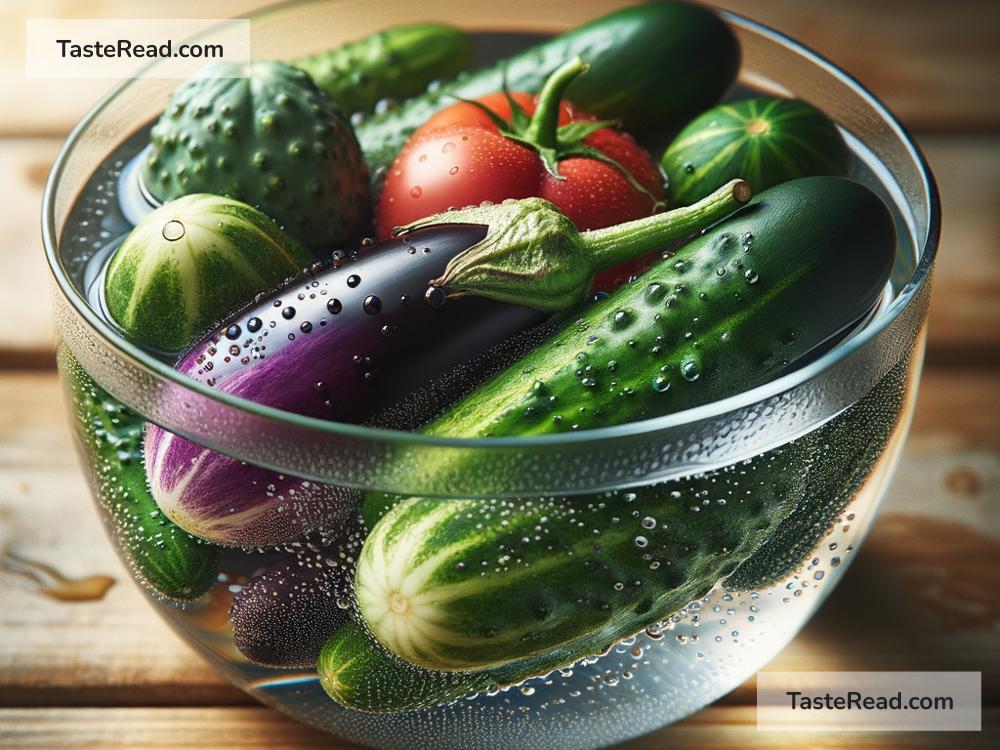How Soaking Vegetables Impacts Bitterness Levels
Have you ever bitten into a vegetable and instantly cringed at its bitter taste? While some people enjoy bitterness, others find it unpleasant. Luckily, there’s a simple trick to make bitter vegetables taste milder—and that trick is soaking them in water. But why does soaking help? What’s actually happening? Let’s dive into it!
What Causes Vegetables to Taste Bitter?
The bitter taste in vegetables comes from naturally occurring compounds called phytochemicals. These special chemicals protect the plant from pests or animals. Some common bitter compounds include:
- Glucosinolates: Found in cruciferous vegetables like broccoli, Brussels sprouts, and kale.
- Alkaloids: Present in nightshade vegetables, such as eggplants.
- Phenolic compounds: Found in certain leafy greens, like spinach and collard greens.
While these compounds help the plant survive in nature, they can make vegetables unappealing for some people.
How Does Soaking Vegetables Work?
When you soak vegetables in water, something interesting happens: the water pulls out some of the bitter compounds. This process is called diffusion—where molecules move from an area of higher concentration (inside the vegetable) to lower concentration (into the water).
Think of it like tea brewing in hot water. When the tea leaves soak, their flavor compounds seep out into the water. In a similar way, the bitter molecules in vegetables can dissipate when soaked.
Do All Vegetables Benefit from Soaking?
Not all vegetables are equally bitter, and not all vegetables need soaking. Vegetables with a noticeably strong bitter taste—like eggplants, bitter gourds, or some leafy greens—can benefit the most from soaking. Here’s how water works on specific veggies:
1. Eggplants
Eggplants can have a slight bitterness due to seeds and alkaloids. Soaking slices of eggplant in salted water can reduce bitterness dramatically. The salt helps draw out those harsh compounds even faster.
2. Bitter Gourd
True to its name, bitter gourd is one of the most bitter vegetables. Soaking it in cold water or salty water can help remove some of its bitterness.
3. Leafy Greens
Certain greens like kale or spinach may taste bitter to some. Soaking them briefly can tone down their bitterness a bit, especially if you’re using them raw in salads.
While soaking works well for intensely bitter vegetables, others like carrots, zucchini, or bell peppers don’t usually need this step—they’re naturally sweet or mild!
Tips for Soaking Vegetables
If you want to reduce bitterness in your veggies, soaking them is easy. Follow these tips:
1. Use Cold Water
Cold water works best for neutralizing bitterness. For even better results, you can add salt to the water. The salt helps extract bitter compounds faster.
2. Time Matters
Soaking for too long can affect the texture or flavor of the vegetable. For most vegetables, 15–30 minutes is enough. For tougher vegetables like bitter gourd, you might soak them for up to an hour.
3. Rinse After Soaking
After soaking, rinse your vegetables with fresh water. This step removes any surface bitterness that has come out into the water during soaking.
4. Consider Pre-Cooking and Soaking
In some cases, you can blanch (briefly boil) vegetables before soaking. This softens them and releases even more bitter compounds.
Beyond Water: Other Ways to Reduce Bitterness
Soaking isn’t the only trick for reducing bitterness! Here are some alternative methods:
1. Salt It Prior to Cooking
Sprinkling salt over sliced vegetables like eggplants can draw out bitterness even before soaking or cooking.
2. Pair with Sweetness
Mix bitter vegetables with sweeter ingredients, like honey, fruits, or caramelized onions, to balance their flavors.
3. Add Acid
Lemon juice, vinegar, or yogurt can mask bitterness. A tangy splash transforms bitter greens into a tasty dish.
4. Cook it Out
Cooking methods like roasting, grilling, or sautéing tend to mellow bitterness naturally by breaking down bitter compounds.
Is Bitterness Bad for You?
Not at all! In fact, many bitter compounds are good for you. Glucosinolates and phenolic compounds have been linked to benefits like fighting inflammation, supporting digestion, and reducing cancer risk. While soaking might reduce their levels slightly, it’s a personal choice depending on how you prefer your vegetables to taste.
A Final Thought
If bitter vegetables haven’t been your favorite, don’t give up on them just yet! Soaking offers a simple, effective way to reduce their strong flavors without needing fancy techniques. Plus, with a little practice, you can turn bitter veggies into delicious dishes that even picky eaters will enjoy.
So, the next time you grab an eggplant or prepare some kale for dinner, give soaking a try—and let your taste buds decide if it makes a difference!


